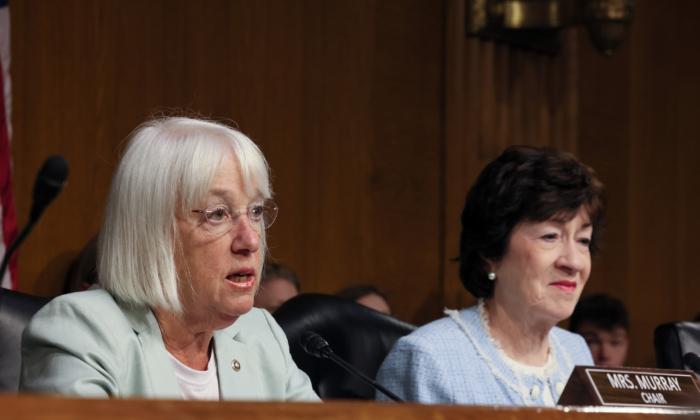The Senate Appropriations Committee cleared their final batch of government funding bills in a bipartisan vote on Thursday, advancing major funding proposals for various departments.
The move marks the first time in five years that all 12 individual appropriations bills were passed by the committee with overwhelming bipartisan support before the end of July.
The bills, totaling billions in funding, include appropriations for Defense; Interior, Environment, and Related Agencies; Labor, Health and Human Services, Education, and Related Agencies; and Homeland Security.
In a joint statement on Thursday, Sens. Patty Murray (D-Wa.) and Susan Collins (R-Maine), chair and vice chair of the Senate Appropriations Committee, celebrated the committee’s achievement.
Ms. Murray and Ms. Collins emphasized their commitment to returning the committee to regular order and working through tough circumstances to achieve this historic feat.
“However, what this committee has achieved over the last several weeks shows that it is possible for Congress to work together and work through real differences—to find common ground and produce serious, bipartisan bills that can be signed into law,” they added.
Both senators expressed determination to deliver investments that will strengthen the economy, ensure national security, and benefit their constituents.
“There’s simply no reason for chaos or gridlock when it comes to making sure our government is funded,” they added. “We are determined to deliver investments that will strengthen our economy, keep our country safe, and do some good for the people we all represent back home.”

12 Appropriations Bills
The approval of all 12 individual appropriations bills in overwhelmingly bipartisan votes marks a significant milestone for the committee. It’s the first time since 2018 that all 12 bills have been marked up, and the entire process was conducted live on video.The committee approved the Fiscal Year 2024 Defense Appropriations Bill in a 27–1 vote, allocating $831.781 billion in total funding. This bill aims to strengthen the country’s military capabilities and readiness, providing support for servicemembers and their families.
Sen. Jon Tester (D-Mont.), chair of the Senate Appropriations Subcommittee on Defense, expressed his commitment to securing a budget that invests in the nation’s defense capabilities to counter potential threats, particularly from China.
The Fiscal Year 2024 Interior, Environment, and Related Agencies Appropriations Bill received unanimous approval in a 28–0 vote, providing $42.695 billion in total funding. This bill focuses on environmental protection, public lands conservation, and investments in tribal communities.
Sen. Jeff Merkley (D-Ore.), chair of the Senate Appropriations Subcommittee on Interior, Environment, and Related Agencies, emphasized the bipartisan effort in meeting the country’s obligations to tribes, protecting lands and waters, and addressing climate-related challenges.
The Fiscal Year 2024 Labor, Health and Human Services, Education, and Related Agencies Appropriations Bill was approved in a 26–2 vote, allocating $224.4 billion in total discretionary funding. This bill prioritizes workers’ rights, education, health care, and mental health services.
Sen. Tammy Baldwin (D-Wis.), chair of the Senate Appropriations Subcommittee on Labor, Health and Human Services, Education, and Related Agencies, expressed pride in delivering legislation that improves the lives of working families and addresses critical challenges.
“This legislation will help communities across the country handle some of their toughest challenges, from fighting the scourge of fentanyl and combatting our mental health crisis to ensuring workers can get the skills they need to land a good-paying job,” Ms. Baldwin said.
Lastly, the committee approved the Fiscal Year 2024 Homeland Security Appropriations Bill in a 24–4 vote, providing $61.3 billion in total discretionary funding. The bill focuses on enhancing security measures, halting the flow of fentanyl and illicit drugs, and supporting resettlement programs for illegal immigrants.
“One of my top priorities as Chair was to ensure this budget supercharges our fight against fentanyl, and I’m proud this bill invests nearly $900 million in new money to dramatically step up our efforts to stop the flow of fentanyl into the U.S. and crack down on transnational criminal organizations,” said Sen. Chris Murphy (D-Conn.), chair of the Senate Appropriations Subcommittee on Homeland Security.
The bills now move forward for further consideration by the Senate and the House before being signed into law.





